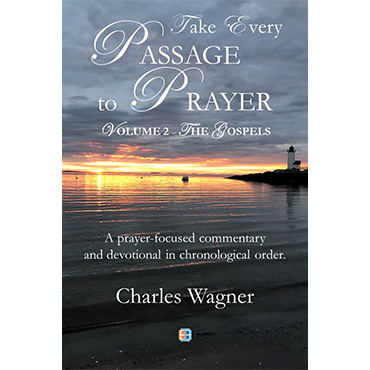The Gramazin Blog

Jesus at Feast of Dedication
Take Every Passage to Prayer - Volume 2, The Gospels
Wednesday August 21, 2024
John 10:22-39
Father, I don't want to be known as a "man of God" because I say spiritual things. I want to be known as a "man of God" because I do the things You want me to do. I want my fingers, hands, arms, feet, and legs to tell of my faith in Jesus Christ. I want to be a man who puts Your commands into practice and touches lives for Christ. Father, thank You for calling me to salvation. Thank You for knowing who I am intimately. Thank You for being my Good Shepherd, continuously protecting me from harm. Thank You for the eternal life that I have received because You chose me for faith and then Your Son revealed Himself to me and helped me to understand my need for the gospel. Amen.
Father, the Jewish people revolted against the Seleucids (the Greeks) in the year 167 BC. The Seleucids had desecrated the temple. The successful revolt, led by fighters associated with Judah Maccabees, recaptured Jerusalem, and rededicated the temple. The Feast (Festival) of Dedication, now known as Hanukkah, was celebrated each year in the wintertime. It was for the celebration of this festival that Jesus had come to Jerusalem.
The text tells us that Jesus was walking in Solomon’s Colonnade. This was a walkway bordered by many columns located on the eastern side of the Outer Court, also known as the Women’s Court. This colonnade was the place where people would come running to see Peter and John after they had healed a lame beggar (Acts 3:11). It was also the place where believers would gather in the book of Acts (5:12).
The Jews gathered around Jesus, pressing Him to be blunt and to finally admit that He is the promised Messiah. Jesus’ response to them makes an important point for believers in the 21st century. He essentially said that actions speak louder than words. It is not what a believer says that counts. It is what they do. If someone claims to be a believer but does not show love towards others, his words becoming meaningless. On the other hand, if someone doesn’t claim to have great faith but shows extraordinary love towards others, their good works reveal the great faith in their heart. Jesus said that all of the miracles He had performed spoke clearly that He was from You, Father, and that You were with Him. His actions spoke for Him.
What do we learn about the gospel from this passage?
- You call people to salvation. The text tells us that You, Father, determine who will come to faith in Jesus Christ. Those “sheep” who have been chosen are given to Jesus, the Good Shepherd. They will hear His voice and listen to what He has to say. Their ears and eyes have been opened to spiritual truths.
- You know believers intimately. Jesus says that He knows the sheep. Jesus knows a believer’s desires, strengths, weaknesses, anxieties, insecurities, faith, character, skills, talents, problems, and circumstances. He guides them accordingly.
- True believers trust that Jesus is the Good Shepherd. The sheep follow the shepherd because they trust Him. They know He means them no harm and only desires to do good for them. A true follower of Jesus has confidence that Jesus is good to them at all times.
- True believers are guaranteed eternal life. Those who are chosen by You, Father, have eternal life and will never perish. No evil force, whether Satanic or human, can take them away from the salvation they received through faith in Jesus.
- Salvation is a work done by both You, Father, and Jesus, Your son. The two of You work in tandem to orchestrate salvation for the sheep. You bring the sheep (believers) and Jesus dies on the cross for their sin and He shepherds (teaches, disciples) them.
However, those who are not chosen by You are sheep that do not belong to Jesus’ flock. They don’t know the Good Shepherd and He doesn’t know them. Nothing He says makes sense to them. Hence, the Jews that were questioning Jesus are not His followers.
The text tells us that the people, incited by Jesus declaring He is one with You, picked up stones to stone Him. Before they threw any stones at Him, He put forth two counter arguments:
- Which one of my miracles requires this stoning? In essence, which one of my good works deserves to be punished? Which person who has been healed by Jesus should have the miracle revoked and they return to their health crisis? Jesus entrapped them. The sympathies of the public would turn against the Jews if they stated that someone’s healing was wrong. They had no choice but to answer as they did: they weren’t stoning Jesus because of any miracle He has performed.
- Since they were accusing Jesus of blasphemy, He asked them to explain Psalm 82:6 where the inspired writer referred to the religious leaders as “gods” because they had been given human authority to judge the people. How could they be so hypocritical, to accuse Jesus of claiming to be God when the psalmist says these the religious leaders are gods? Jesus stated that if the psalmist was willing to call the religious leaders “gods”, why wouldn’t the Father call His own dear Son “God”, the one He sent into the world? However, Jesus stated that the people should not believe He is God because He said so but because He has proven that He does miracles that He could only do if He was one with You, Father.
This passage concludes by informing the reader that the people tried to seize Jesus, but He was able to escape. Amen.
Late November or December of each year in the 21st century. This feast was a celebration of the rededication of the temple during the Maccabean Revolt circa 167-160 BC. It is likely that there weren’t many people in the vicinity due to the chill in the air. Jesus had not come to a crowded area to teach and heal. Jesus was essentially minding His own business. He was not teaching or preaching. He was accosted by the Jews who encircled Him.
Jesus is reluctant to call Himself the Messiah because the people understood that term to mean a political savior who would come and lead a rebellion against Rome.
Jesus has clearly communicated that He is God: John 3:15-16; John 5:19-23, 39; John 6:48; John 7:28-29; John 8:12, 29, 42, 46, 58; John 9:37; John 10:9, 11, 17-18;
The author of this book does believe in the Biblical doctrine of predestination (God has pre-determined who will be saved). He is aware that many brothers and sisters in Christ, who also love the Word of God and who have studied it intensely, do not believe in the doctrine predestination. They are Arminian (no one is pre-determined to be saved, salvation is available to everyone equally). Both sides agree on what is most important, salvation comes through faith in Jesus Christ alone.
From time to time in the news we hear of well-known Christian leaders who step away from the faith, denying the gospel they once professed. According to this passage, there is reason to question whether they were believers to begin with. Jesus has promised that His sheep will never be snatched from His hand.
Psalm 82 speaks of God judging the religious leaders who thought of themselves as gods. Such leaders defended what was unjust and showed partiality to the wicked. They did not defend the weak and fatherless. They did not uphold the cause of the poor and the oppressed. They did not rescue the weak and needy from the hands of the wicked. The writer considers them clueless, walking around in darkness not understanding anything. Sarcastically, the Psalmist said that even though these leaders think themselves as gods, they will die like mere mortals, falling like every other ruler. The Psalmist concludes Psalm 82 with a call for God to judge the earth.







